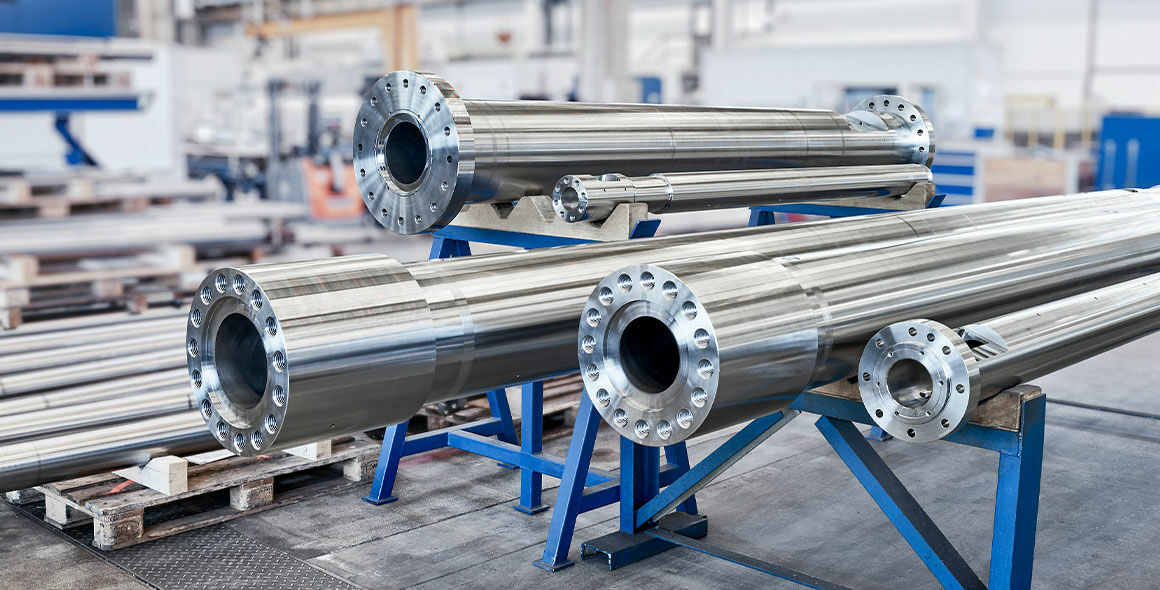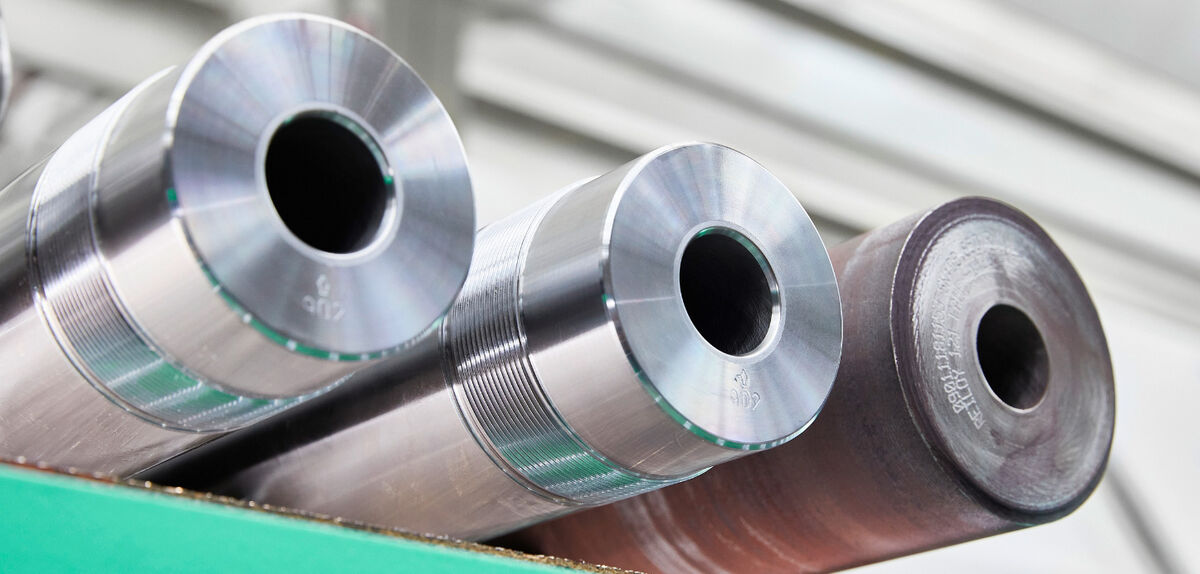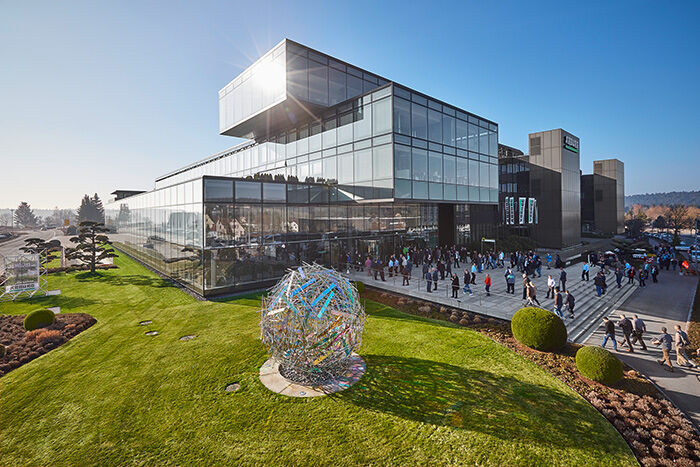
Wear protection for all cases
Manufacturers of injection-molded plastic parts rely on rugged and efficient equipment. One of the world's leading manufacturers is ARBURG, with a portfolio that includes ALLROUNDER injection-molding, freeformers for industrial additive manufacturing, and robotic systems. Founded in 1923 at its headquarters in Lossburg in the Black Forest, the family-owned company today supplies customers around the world and in all industries. ARBURG machines are used, for example, to produce components for automotive engineering, electrical engineering, electronics, and medical engineering, as well as packaging, household goods, and toys.
at 34 locations in 25 countries
(konsolidierter Umsatz 2021)
The type of materials processed is as varied as the range of applications: from standard plastics to industrial high-performance plastics, either in pure form or with a wide variety of fillers. This makes carefully balanced wear protection all the more important for the service life and durability of machine components. ARBURG's prime objective is to support customers to manufacture their plastic products from one-off parts to high-volume production, in top quality, and at minimum unit costs.
The core of an injection molding system is the plasticizing unit with its screws and barrels. ARBURG purchases most of the blanks for barrels from Reifenhäuser Reiloy. This Reifenhäuser Group business unit specializes in highly wear-resistant barrels and screws for extrusion and injection molding. “Metallurgy is a number 1 priority for us. We produce our hard alloys ourselves and work closely with raw material manufacturers, material scientists, and mechanical engineers," says Dr. Anna Rottstegge, Head of Research & Development at Reifenhäuser Extrusion Systems.
Reifenhäuser Extrusion Systems
As part of the Reifenhäuser Extrusion Systems
business unit, Reifenhäuser Reiloy manufactures highly wear-resistant barrels and screws for extrusion and injection-molding applications. Proprietary hard alloys and processes provide top-class wear protection that reliably protects components against abrasion, adhesion, and corrosion.
This is something that ARBURG also appreciates. The business relations between the two long-established companies go back nearly 40 years. Over this time, there has been a continuous rise in demand for units with greater wear protection, says Dr. Thomas Walther, Head of Application & Process Development at ARBURG.
Up to about 25 years ago, many components such as barrels and screws were still made of nitrided steel. Today, this is no longer sufficient. Since plastics have changed - for example, due to additives, such as glass or carbon fibers for reinforcement, flame protection systems or, more recently, higher recyclate content, - what the plastics processing industry now needs is much more wear-resistant alternatives. ARBURG virtually uses only bimetallic barrels and selects the appropriate wear protection from the range of different alloys that Reifenhäuser Reiloy has on offer.

Plant operators should be prepared for any eventuality
The main requirements for wear protection depend on throughput and the raw material to be processed. For instance, a manufacturer that primarily processes a plastic with a glass fiber content knows exactly what to expect and can select the specific wear protection accordingly. On the other hand, post-consumer recyclate (PCR) is literally a surprise package, explains Walther, an application technology specialist: "Anything can turn up, from reinforcing parts to foreign bodies. That's why you have to be ready for any eventuality when you process PCR and then it’s advisable to use highly wear-resistant components.”
High filler content is also a stress test for the plasticizing unit. "Today, materials often have very high filler contents," says Walther. "At the same time, even filler contents of 50 to 70% are no longer the exception. In fact, it has almost become standard practice for injection-molded industrial parts. These contents accelerate abrasion. As a result, our requirements for wear protection are correspondingly high."
Wear produces scrap
Basically, wear affects all parts of the injection-molding machine that come into contact with the plastic. On the one hand, this includes the barrels, which Reifenhäuser Reiloy supplies as blanks, as well as the screws and check valves, that ARBURG manufactures in-house. Wear has the greatest impact on the check valve, i.e. the sealing ring or the barrel. If the gap increases here, the result is a major drop in process quality and stability.
Just as critical are roughened surfaces in the entire plasticizing unit, because this causes the liquid plastic to adhere to the barrel surfaces, leading to very long dwell times in the heated system, and ultimately ends in thermal degradation. The consequences are imperfections, such as streaks or black spots on the injection-molded part. “The manufacturer cannot sell a product in this condition, so it ends up as scrap. This applies not only to transparent optical components, but to all visibly installed parts, such as covers in automotive assembly," says Walther.

Good wear protection always pays off
The length of time components withstand critical wear depends on many different parameters. On the downside, however, saving on wear protection means economizing at the wrong end of the stick, says Thomas Sion, who works in process development at ARBURG. This conclusion is gaining ground on the market. "Lines with low-quality wear protection versus lower entry price are now selling less well because customers are becoming sensitized and attaching greater importance to long service life."
Change the alloy and double service life
Sometimes, it only becomes apparent during operation what wear protection design will bring the best results. "If a line operates at lower productivity than expected or if components wear out too quickly, it may be advisable to choose a different alloy," explains Claudia Rosenbach, Head of Key-Account Management at Reifenhäuser Reiloy.
Finding the right alloy
Reifenhäuser Reiloy offers a wide range of iron-based and nickel-based alloys for bimetallic barrels and advises customers on selecting the right wear protection for their specific application.
Overview: Alloys from Reifenhäuser Reiloy
Reiloy iron-based alloy R121 with uniquely high density of ceramic phases.

This turned out to be the efficient solution in an unusual case that Sion describes: One customer reported their barrels were totally worn after only 10,000 hours. After ARBURG replaced it with a barrel plated with a different alloy from Reifenhäuser Reiloy, virtually no wear was detectable, even after 20,000 hours.
Two market leaders assume responsibility
As a result of long-standing business relations and close collaboration between ARBURG and Reifenhäuser Reiloy, the injection-molding machine specialist can always offer customers the right state-of-the-art solution when it comes to wear protection. When Reifenhäuser Reiloy launches new alloys on the market, ARBURG's application engineers analyze the range of possible applications and the resulting benefits.
"The well-established planning instruments between ARBURG and Reiloy over the years result in sustained delivery reliability," says Arthur Kopp, Head of Materials Management. He adds that close proximity is also an advantage since delivery routes are short. ARBURG has an in-house manufacturing rate of about 60% and purchases additional components locally as far as possible, or from Germany, as all machines are produced at the German corporate headquarters in Lossburg. Here, two traditional companies with "made in Germany" quality supplement each other and together contribute to making plastics processing more sustainable.
Wear protection promotes sustainability

arburgGREENworld
Processing recyclates is a core component of the arburgGREENworld program. ARBURG has combined software and hardware solutions so that customers can process the ever-increasing variety of these materials more flexibly and reliably, thus making a contribution to greater sustainability in plastics processing.